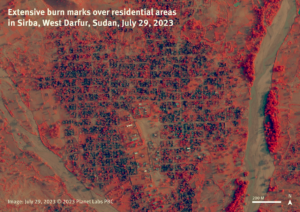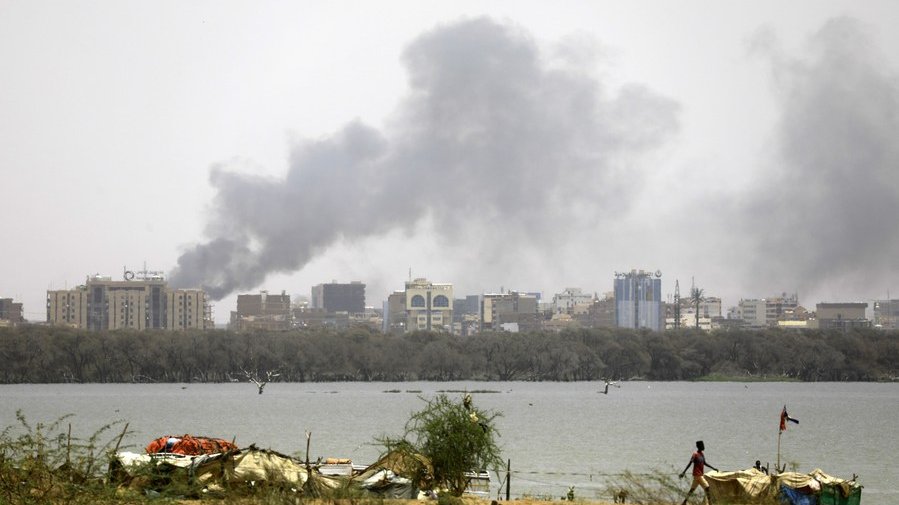Lee en español aquí
The fighting between the Sudanese Armed Forces (SAF) and the paramilitary Rapid Support Forces (RSF) shows no signs of abating as the war is about to enter its fifth month on August 15, leaving thousands dead, over four million displaced, and more than 20 million hungry.
War planes and artillery continued to bombard Sudan’s capital region on Saturday, August 12, even as thousands of dead bodies are reportedly rotting on its streets, posing the additional risk of disease outbreaks when the healthcare system is teetering on the verge of total collapse. Corpses in mortuaries have also begun to decompose in the heat due to lack of refrigeration amid prolonged power outages.
“A horrifying combination of rising numbers of corpses, severe water shortages, non-functioning hygiene and sanitation services, and lack of water treatment options are also prompting fears of a cholera outbreak in the city,” Save the Children warned in a statement on Tuesday, August 8.
The activists of the local Resistance Committees (RCs), who had been leading the pro-democracy protests against the military junta before the war started on April 15, have been digging graves to bury the corpses in Omdurman, a sister city of capital Khartoum.
Sudan is in no position to handle a disease outbreak with only 18 of its 89 main hospitals functioning, at only partial capacity. The remaining 71 are out of service, either due shortages or due to at least 53 direct attacks on the healthcare facilities, killing and wounding over two dozen medics.
“In these conditions, dialysis patients are dying one after the other, many women are losing their lives giving birth at home without any recourse, and even malaria— so easy to treat orally—is becoming severe because of the shortages,” said Sylvain Perron, program manager of Doctors Without Borders who has been working in Khartoum. “Add to this the existence of massive sexual violence committed on a daily basis.”
He also raised concern about children succumbing to diseases. “Between 15 May and 17 July, over 300 deaths, mainly among children under 5 years, were reported due to measles and malnutrition,” according to the UN Refugee Agency (UNHCR).
The UN World Food Programme (WFP) said on Friday, August 11, that 20.3 million people, amounting to about 42% of the country’s population, are suffering from “severe acute hunger.” 6.3 million of them, amounting to 13% of the population, are “just one step from famine, with the conflict continuing to disrupt access to humanitarian aid and forcing millions to flee their homes,” said the UN.
The most food insecure state in Sudan is West Darfur, where entire villages have been burnt down by the RSF and its allied militias, leaving behind patches of scorched earth visible all over the satellite image of the residential areas of Sirba, captured by Planet Labs PBC on July 29. At least 460 were reportedly killed and thousands wounded in this town over the span of a few days late last month.

These militias were organized under the regime of former dictator Omar al-Bashir during the Darfur civil war in the 2000s by recruiting Arab-speaking nomadic herders to help the SAF crush the rebel groups of the sedentary farming communities speaking local African languages.
While many of these militias, accused of mass atrocities, were later coalesced to form the RSF in 2013, those militias left out of the paramilitary were not disarmed and disbanded. With the support of the RSF, they have continued attacks, displacing millions in West Darfur even after the armed rebel groups signed the Juba peace agreement in 2020 in exchange for a share in state power, after Bashir was ousted in April 2019 by the December Revolution.
However, Bashir’s trusted generals who were forced under the pressure of mass demonstrations to remove him — SAF chief Abdel Fattah al Burhan and RSF head Mohamed Hamdan Dagalo, a.k.a Hemeti — formed a military junta. Burhan took the helm as its chairman, appointing Hemeti as his deputy.
The short-lived joint civilian-military transitional government that was formed in August 2019, after the right-wing political parties and the junta reached an agreement to share power, was dissolved by Burhan and Hemeti who seized all power in a coup in October 2021.
When the internal power-struggle between Burhan and Hemeti escalated into a full-blown war between the SAF and the RSF, the latter, taking advantage of the anarchy, accelerated what has been called a “depopulation campaign” in the mineral-rich Darfur, whose gold mines it controls. West Darfur in particular has been suffering the worst of the attacks. According to some reports, more than 10,000 have been killed here since the war started between SAF and RSF.
Over 4 million displaced
Over 300,000 have fled from this state to neighboring country, Chad. Including those who have fled to the Central African Republic, Egypt, Ethiopia, and South Sudan, this war has produced at least 884,000 refugees and asylum seekers.
The total displacements have exceeded 4 million, with more than 3 million “internally displaced across [all the] 18 states” by the start of this month, according to the UN Office for the Coordination of Humanitarian Affairs (OCHA).
Over 71% of them fled from the three cities of Khartoum State — capital Khartoum, Khartoum Bahri (North) and Omdurman — where the RSF troops have positioned themselves in residential areas, which the SAF is trying to reclaim by shelling and striking from airplanes.
“Many of those trapped by the fighting have been unable – and in some cases actively prevented – from seeking safety elsewhere. And those that can escape face other dangers: They are vulnerable to abuse, theft and harassment during their journeys to safer areas,” Clementine Nkweta-Salami, Humanitarian Coordinator in Sudan, said on Aug 9.
“A full-fledged civil war will spare neither camels nor cattle”
Cautioning the youth against falling prey to the attempts by both sides to step up recruitment, the Sudanese Communist Party (SCP), which had played a crucial role in the December Revolution, warned of the risk of “a full-fledged civil war that will spare no one.”
Casualties in such a war will not be limited to the capital region, Darfur and other states which had already experienced civil wars, the party warned. “It will not be content with those it has killed, injured, and devastated… It will also destroy the land and wildlife, sparing neither camels nor cattle,” said its statement.
“This is a war that holds no benefit for the people of Sudan.. [I]t is a war between the wealthy elite of the regime… and those who seek to inherit their power, including the new parasites and agents of foreign capital hungry for our resources, lands, and ports.”





